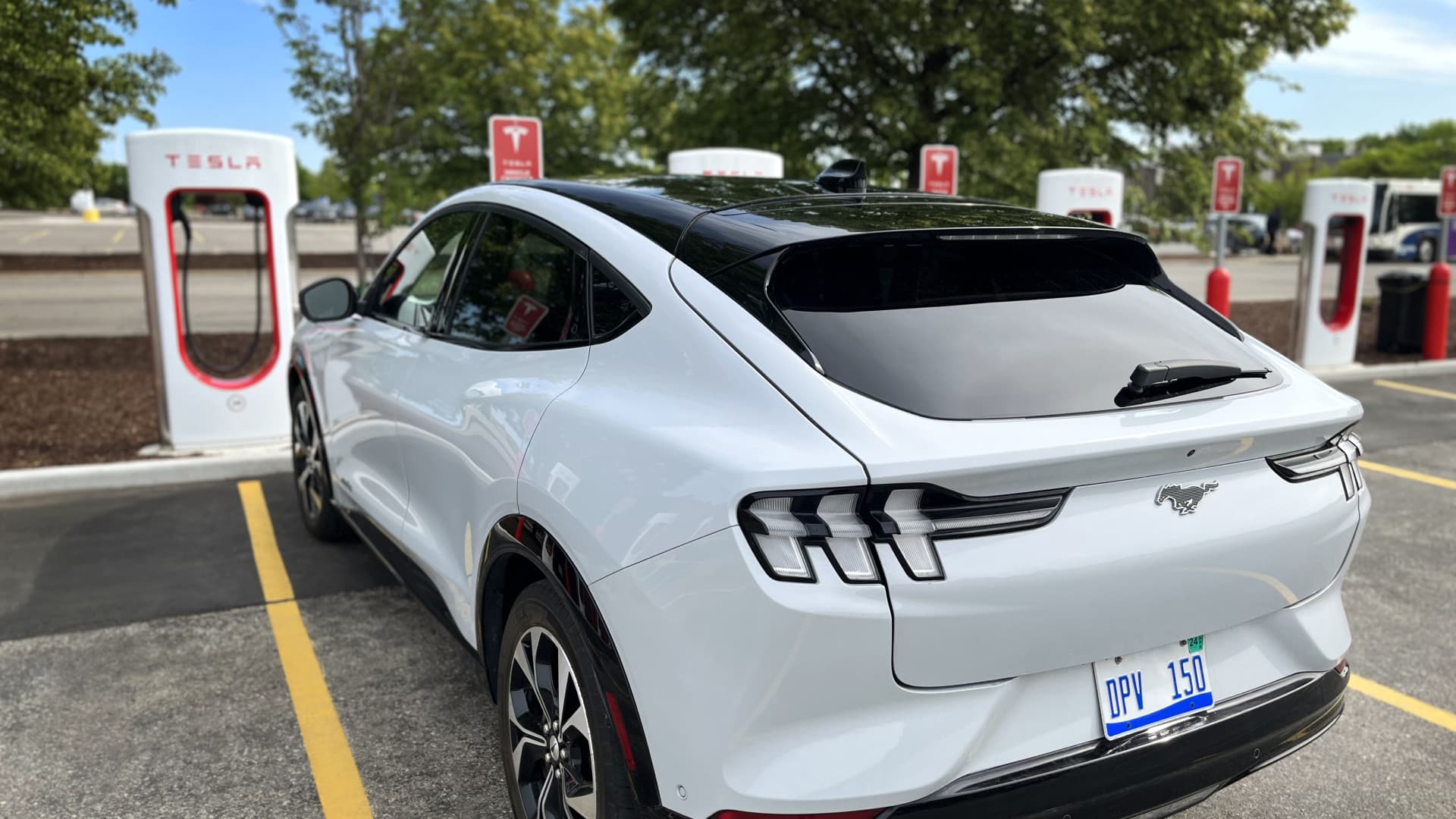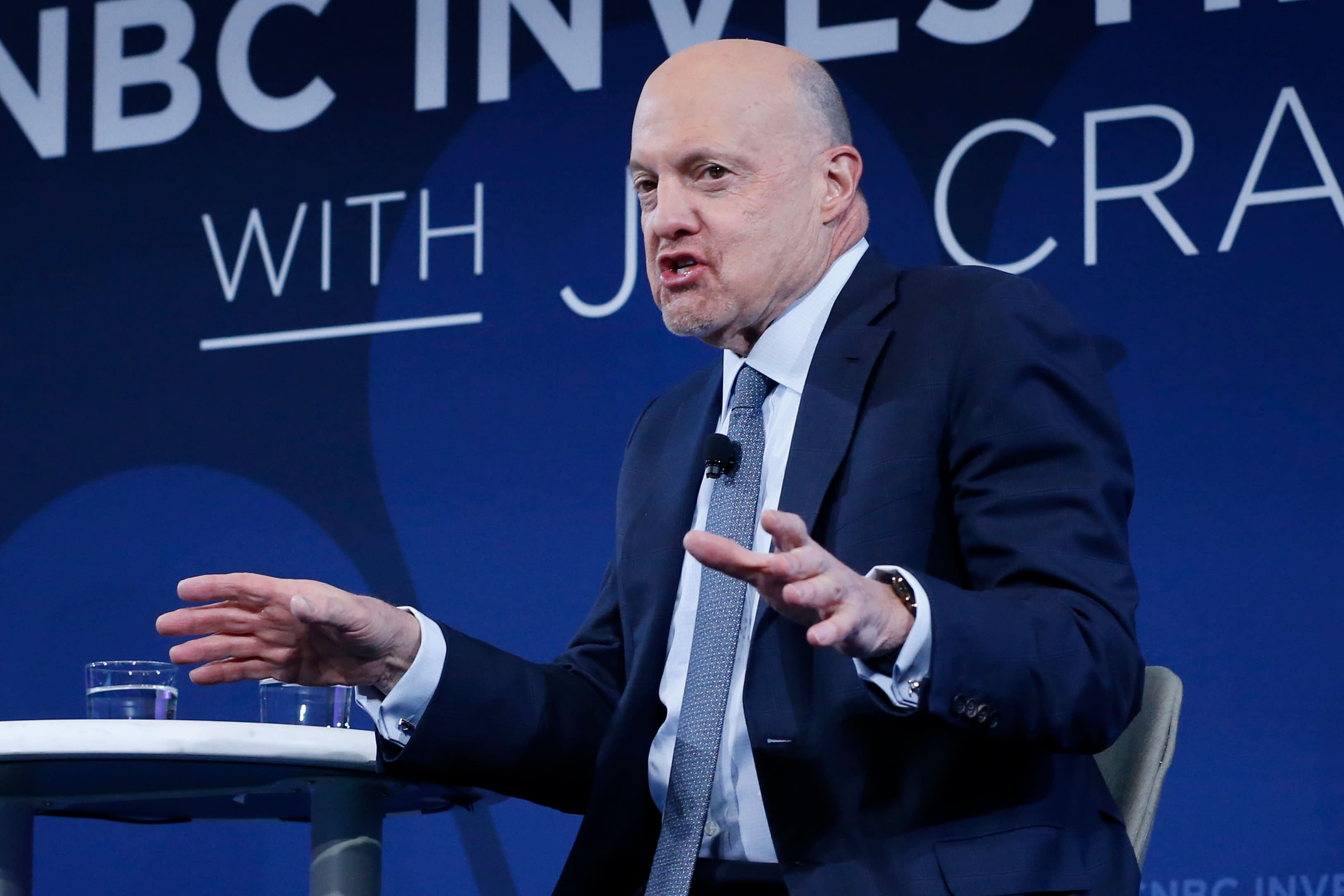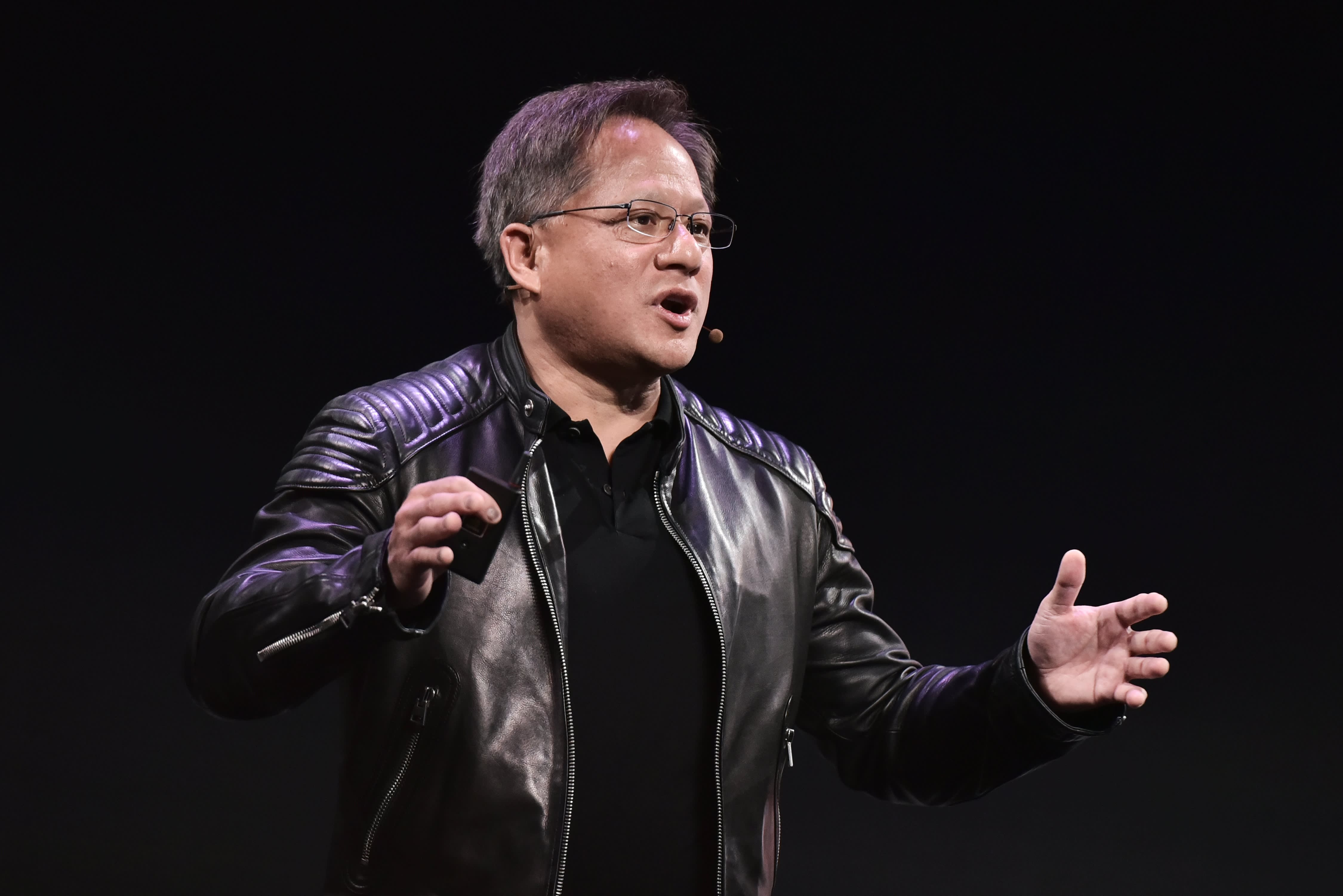DETROIT – A surprise deal between Ford Motor and Tesla on electric vehicle charging technology and infrastructure could put new pressure on other automakers’ EV strategies.
The tie-up between the two rivals will give Ford owners access to more than 12,000 Tesla Superchargers across the U.S. and Canada, starting early next year. More importantly, Ford’s next-generation of EVs — expected by mid-decade — will use Tesla’s charging plug, allowing owners of Ford vehicles to charge at Tesla Superchargers without an adapter.
related investing news
The agreement will make Ford among the first automakers to explicitly tie into the network.
Ford CEO Jim Farley and Tesla CEO Elon Musk announced the deal Thursday during a live audio discussion on Twitter Spaces. On Friday morning, Farley acknowledged the tie-up would create challenges for Ford’s rivals.
“I think GM and others are going to have a big choice to make,” he said on CNBC’s “Squawk Box.”
Farley’s comments referenced which EV plug should be standard for charging in the U.S. A charger known as CCS is the industry norm now. Tesla vehicles and its Supercharger network use what’s known as NACS. Other vehicles can use both, but they need an adapter.
“The CCS is a great standard, but it was pretty much done by kind of a committee, and I think GM and others are going to have a big choice to make,” Farley told CNBC. “Do they want to have fast charging for customers? Or do they want to stick to their standard and have less charging?
Ford’s stock rose more than 7% during Friday trading, above $12 per share. Tesla’s stock climbed more than 5%, topping $194 a share.
The Ford-Tesla deal could be a near-term negative for GM and other automakers that don’t have access to as many fast chargers, which are considered crucial to expand EV adoption, said RBC Capital analyst Tom Narayan
“The news is obviously a positive for Ford shares today (and potentially near term negative for GM/STLA), but ultimately, we think this should be viewed as Tesla playing the long game,” Narayan said in a Friday investor note.
Tesla says it has roughly 45,000 Supercharger connectors worldwide at 4,947 Supercharger Stations. The company does not break out how many are in the U.S. The U.S. Department of Energy reports the country only has about 5,300 CCS fast-chargers.
General Motors, without specifically addressing Farley’s comments, said it “believes that open charging networks and standards are the best way forward to enable EV adoption across the industry.” GM said it is working with a group of companies and the Society of Automotive Engineers to develop and continue to refine an open connector standard for CCS, which it said was important for “the buildout of an open network of fast charging across North America.”
The Detroit automaker has announced several partnerships with EV charging providers and lobbied for more federal support for such infrastructure.
Stellantis, which Narayan mentioned as another company that could feel the effects of the Ford-Tesla deal, did not immediately respond to a request for comment.
‘Totally committed’
Ford is “totally committed” to a single U.S. charging protocol that includes the Tesla plug port, Farley said Thursday.
Musk, when announcing the deal with Farley, alluded to other automakers being able to use the Tesla Supercharger network and the company’s charging ports.
“Working with Ford, and perhaps others, can make it the North American standard, I think that consumers will be all better for it,” Musk said Thursday.
Tesla previously discussed opening its private network to other EVs. White House officials announced in February that Tesla committed to opening up 7,500 of its charging stations to non-Tesla EV drivers by the end of 2024.
Public charging of electric vehicles is a major concern for potential buyers, and no automaker other than Tesla has successfully built out its own network. Instead, they’ve announced partnerships with third-party companies that have often proven unreliable and frustrating to owners.
Most U.S. drivers log vehicle miles from home to locations nearby. But EV buyers who want to take longer road trips, or who do not have access to a garage with a charger, often worry about access to reliable, public charging.
The issue is getting worse: at least one in five charging attempts by drivers failed last year, according to a study on public charging released earlier this year by J.D. Power.
Tesla’s Superchargers were ranked the best for overall customer satisfaction, according to a separate new study from J.D. Power.
Wall Street bullish
Wolfe Research analyst Rod Lache called the deal a “win-win,” as it more than doubles Ford customers’ access to fast chargers and increases Tesla’s network’s utilization.
“For Ford, access to Tesla’s network helps solve a major pain-point for their EV customers, who otherwise have to use third-party charging providers,” he said in a Friday investor note. “Meanwhile, for Tesla, adding Ford customers will help boost network utilization, a key driver of profitability.”
The deal is a major boost to access to fast-chargers for Ford and its customers, Morningstar analyst David Whiston said. He added that it “puts some pressure on other legacy automakers but if you are someone like GM, I don’t think you need to panic.”
Whiston said he would like to know more about the deal, such as cost, length and other details that were not announced.
A Ford spokesman said more information about the deal will be announced closer to Tesla’s chargers opening up to Ford owners early next year.
– CNBC’s Michael Bloom, Lora Kolodny and John Rosevear contributed to this report.




ivermectin 12mg for humans for sale – brand carbamazepine 400mg tegretol 200mg generic
buy amoxil generic – order diovan 160mg for sale generic ipratropium 100mcg
azithromycin online order – order azithromycin 250mg for sale order nebivolol 5mg sale
buy prednisolone 5mg – prometrium 200mg pills progesterone 100mg us
order neurontin 800mg without prescription – order sporanox 100 mg generic order itraconazole 100 mg without prescription
order lasix 100mg for sale – betnovate 20gm sale3 order betnovate 20 gm without prescription
order amoxiclav pill – purchase amoxiclav online buy cymbalta pills for sale
order amoxiclav sale – order duloxetine online cymbalta 20mg sale
order rybelsus online cheap – semaglutide buy online order cyproheptadine generic
where can i buy zanaflex – buy generic zanaflex for sale purchase microzide for sale
brand cialis 40mg – order tadalafil 10mg pills sildenafil 50mg brand
purchase sildenafil sale – sildenafil 50mg cost tadalafil 5mg for sale
order cenforce 100mg – oral aralen 250mg metformin 500mg price
atorvastatin 40mg over the counter – amlodipine 5mg brand order lisinopril 2.5mg online cheap
how to buy prilosec – atenolol oral buy tenormin medication
depo-medrol price – methylprednisolone 8mg otc buy aristocort generic
order clarinex online cheap – buy generic priligy online order priligy online cheap
order zovirax 800mg online cheap – allopurinol 300mg usa oral crestor 10mg
domperidone 10mg without prescription – order tetracycline 250mg buy cyclobenzaprine 15mg pill
buy generic propranolol online – buy methotrexate pill methotrexate online buy
buy generic coumadin 2mg – buy reglan buy losartan 50mg generic
purchase esomeprazole without prescription – buy esomeprazole medication imitrex for sale
purchase levofloxacin without prescription – order avodart generic order ranitidine 300mg online
buy mobic 7.5mg online – celecoxib cheap order tamsulosin pill
buy zofran 4mg online cheap – zofran uk where can i buy simvastatin
valtrex 1000mg us – order valtrex sale diflucan 200mg brand
buy modafinil 100mg order modafinil 200mg online cheap buy provigil online provigil us buy provigil for sale provigil ca order provigil 200mg online cheap
I’ll certainly carry back to read more.
More posts like this would make the online space more useful.
order azithromycin 250mg without prescription – order azithromycin 250mg pills order metronidazole sale